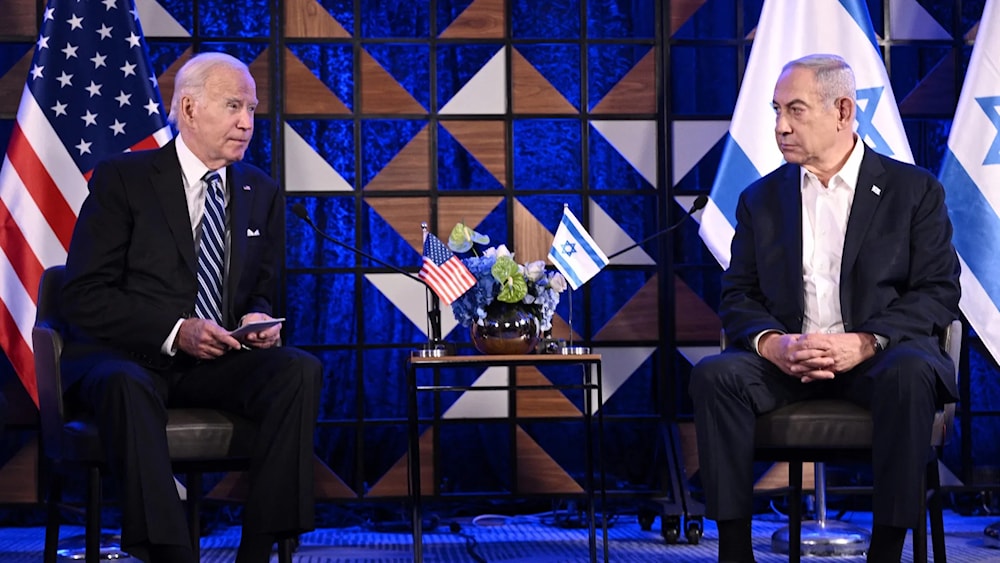Netanyahu latest assassinations another snub, disregard to Biden admin
The recent assassination of the head of the political bureau of Hamas in Iran further undermines US-Israeli ties with both sides following different methods or goals.
-

Biden and Netanyahu in “Israel” last October (AFP via Getty)
The assassination of the head of Hamas' political bureau in Iran Ismail Haniyeh has put more strains on relations between the Biden administration and the Israeli Prime Minister, noted Patrick Wintour, Diplomatic Editor at The Guardian, in a recent article.
A week ago, while standing with Donald Trump in Florida, Benjamin Netanyahu was vague on the latest prospects of a ceasefire in Gaza, as per Wintour. "I hope we are going to have a deal. Time will tell," Netanyahu remarked, shortly after his contentious address to a joint session of the US Congress.
During his three-day visit to the US, Netanyahu carefully avoided making any firm commitments to the ceasefire plan proposed by Biden on May 31.
Meanwhile, reports indicated that the US administration was exerting strained efforts to secure Netanyahu's commitment to a permanent ceasefire. Reports now indicate that while Netanyahu was publicly discussing the potential for a deal, a plan to assassinate the head of Hamas' political bureau in Iran was already set. Shortly after Ismail Haniyeh, the senior Hamas leader was assassinated on Wednesday night.
The US often appears as the junior partner in its relationship with 'Israel'
In Wintour's view, the potential repercussions of Haniyeh's assassination were evident to everyone. The Qatari prime minister, Sheikh Mohammed bin Abdulrahman al Thani, expressed frustration and accused Netanyahu of undermining the peace process. "How can mediation succeed when one party assassinates the negotiator on the other side?" he questioned.
According to observers, as cited by Wintour, the assassination undermines the US position, leaving it to look like the "junior partner" in the US-Israeli duo.
Matt Duss, a former foreign policy advisor to Bernie Sanders, said, “It is another case of Netanyahu putting up two fingers to Biden. There has been month after month after month of these just repeated affronts and humiliations from Netanyahu, culminating in this ridiculous moment last week, where he came and spoke in front of Congress yet again, to undermine Biden’s ceasefire proposal. Yet Biden, who sets such store by personal relations, refuses to change course.”
Duss has criticized Biden for not using control over US weapon supplies as leverage with "Israel", allowing Netanyahu to continue the war without constraints.
After the assassination, Biden had to call Netanyahu two days later, assuring him of US support. Any private criticism or disapproval from Biden was not evident in the public account of the call. Biden subsequently voiced his frustration to reporters, stating, “We have the basis for a ceasefire. They should move on it now.” Asked if Haniyeh’s assassination had destroyed the prospect of a deal, the President admitted the least, saying, “It has not helped.”
"The killing is a further indicator of how the Biden administration cannot capitalize on a security relationship with a politician whose methods and objectives it does not share," Wintour wrote.
The US administration also suspects that Netanyahu prefers the success of a political rival in the upcoming US election since both Trump and Netanyahu have a shared goal: maintaining political power to avoid criminal charges against themselves, according to the writer.
The effectiveness of "Israel's" long-term strategy for "dismantling Hamas", as per Wintour, is also in question, particularly concerning its use of assassinations abroad.
Hugh Lovatt, a Middle East specialist at the European Council on Foreign Relations, describes the Israeli assassination of Hezbollah and Hamas leaders "as a tactical victory, but a strategic defeat."
Read more: Strategic overview: What options the Axis of Resistance is facing?

 4 Min Read
4 Min Read








